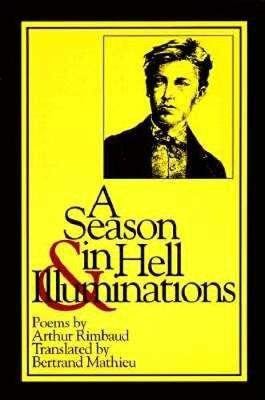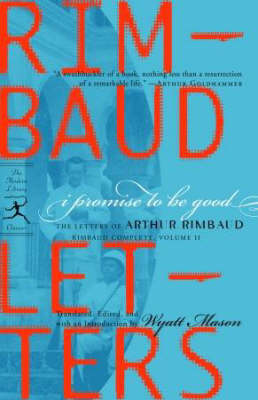Modern Library Classics (eBook)
2 total works
Translated, edited and with an Introduction by Wyatt Mason
“The definitive translation for our time.”
–Edward Hirsch
From Dante’s Inferno to Sartre’s No Exit, writers have been fascinated by visions of damnation. Within that rich literature of suffering, Arthur Rimbaud’s A Season in Hell–written when the poet was nineteen–provides an astonishing example of the grapple with self.
As a companion to Rimbaud’s journey, readers could have no better guide than Wyatt Mason. One of our most talented young translators and critics, Mason’s new version of A Season in Hell renders the music and mystery of Rimbaud’s tale of Hell on Earth with exceptional finesse and power.
This bilingual edition includes maps, a helpful chronology of Rimbaud’s life, and the unfinished suite of prose poems, Illuminations. With A Season in Hell, they cement Rimbaud’s reputation as one of the foremost, and most influential, writers in French literature.
“The definitive translation for our time.”
–Edward Hirsch
From Dante’s Inferno to Sartre’s No Exit, writers have been fascinated by visions of damnation. Within that rich literature of suffering, Arthur Rimbaud’s A Season in Hell–written when the poet was nineteen–provides an astonishing example of the grapple with self.
As a companion to Rimbaud’s journey, readers could have no better guide than Wyatt Mason. One of our most talented young translators and critics, Mason’s new version of A Season in Hell renders the music and mystery of Rimbaud’s tale of Hell on Earth with exceptional finesse and power.
This bilingual edition includes maps, a helpful chronology of Rimbaud’s life, and the unfinished suite of prose poems, Illuminations. With A Season in Hell, they cement Rimbaud’s reputation as one of the foremost, and most influential, writers in French literature.
One of the most written-about literary figures in the past decade, Arthur Rimbaud left few traces when he abandoned poetry at age twenty-one and disappeared into the African desert. Although the dozen biographies devoted to Rimbaud’s life depend on one main source for information—his own correspondence—a complete edition of these remarkable letters has never been published in English. Until now.
A moving document of decline, Rimbaud’s letters begin with the enthusiastic artistic pronouncements of a fifteen-year-old genius, and end with the bitter what-ifs of a man whose life has slipped disastrously away. But whether soapboxing on the essence of art, or struggling under the yoke of self-imposed exile in the desert of his later years, Rimbaud was incapable of writing an uninteresting sentence. As translator and editor Wyatt Mason makes clear in his engaging Introduction, the letters reveal a Rimbaud very different from our expectations. Rimbaud—presented by many biographers as a bohemian wild man—is unveiled as “diligent in his pursuit of his goals . . . wildly, soberly ambitious, in poetry, in everything.”
I Promise to Be Good: The Letters of Arthur Rimbaud is the second and final volume in Mason’s authoritative presentation of Rimbaud’s writings. Called by Edward Hirsch “the definitive translation for our time,” Mason’s first volume, Rimbaud Complete (Modern Library, 2002), brought Rimbaud’s poetry and prose into vivid focus. In I Promise to Be Good, Mason adds the missing epistolary pieces to our picture of Rimbaud. “These letters,” he writes, “are proofs in all their variety—of impudence and precocity, of tenderness and rage—for the existence of Arthur Rimbaud.” I Promise to Be Good allows English-language readers to see with new eyes one of the most extraordinary poets in history.
A moving document of decline, Rimbaud’s letters begin with the enthusiastic artistic pronouncements of a fifteen-year-old genius, and end with the bitter what-ifs of a man whose life has slipped disastrously away. But whether soapboxing on the essence of art, or struggling under the yoke of self-imposed exile in the desert of his later years, Rimbaud was incapable of writing an uninteresting sentence. As translator and editor Wyatt Mason makes clear in his engaging Introduction, the letters reveal a Rimbaud very different from our expectations. Rimbaud—presented by many biographers as a bohemian wild man—is unveiled as “diligent in his pursuit of his goals . . . wildly, soberly ambitious, in poetry, in everything.”
I Promise to Be Good: The Letters of Arthur Rimbaud is the second and final volume in Mason’s authoritative presentation of Rimbaud’s writings. Called by Edward Hirsch “the definitive translation for our time,” Mason’s first volume, Rimbaud Complete (Modern Library, 2002), brought Rimbaud’s poetry and prose into vivid focus. In I Promise to Be Good, Mason adds the missing epistolary pieces to our picture of Rimbaud. “These letters,” he writes, “are proofs in all their variety—of impudence and precocity, of tenderness and rage—for the existence of Arthur Rimbaud.” I Promise to Be Good allows English-language readers to see with new eyes one of the most extraordinary poets in history.

